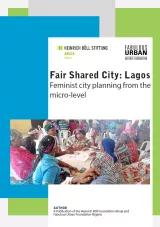Fair Shared City: Lagos
Content is no longer being updated
The current thinking, approaches and instruments for urban development in Lagos and other Nigerian cities are based on a technical–instrumental orientation of urban planning. But in Lagos, as in most cities in the developing world, this orientation is far from delivering the expected results. It conceives of functioning city government institutions that are responsible for centralised planning, public infrastructure and service delivery, but its understanding of “functioning institutions” is largely based on models imported from Asia and the West that are influenced by neoliberal policies of deregulation and privatisation and have been promoted by international institutions like the World Bank since the 1990s.
Over the past decades, the government of Lagos has introduced complex public-private partnerships, with the participation of foreign private or state investors, to plan and implement giant infrastructure and real-estate developments like Eko Atlantic City and the Lekki Free Zone. The principal planning instrument for the city government is the Lagos State Development Plan (LSDP), which aims to provide overall direction for the growth and the development of the city of this smallest state of Nigeria with its bordering rural areas up to 2025. A major result of the LSDP was the establishment of the Office for Overseas Investments (Lagos Global), which is responsible for prioritising private-sector-led economic growth, increasing the ease of doing business in Lagos and attracting investment. While it might seem reasonable at first glance to attract international investment to finance infrastructure and real-estate projects, these projects have ignored the needs of the vast majority of the urban residents for jobs, sanitation and shelter. The urban dwellers, on the contrary, have found their own strategies within their informal networks to make their environment work.
This shows that the LSDP needs an assessment. It was not based on careful research and rather perpetuates past strategic-development plans and statements. A different approach to urban planning is needed: one that will build on residents’ successful initiatives at the micro level. A deeper understanding of what already works in today’s Lagos, no matter how precarious, rough or informal it might be, would lead to a more pragmatic and effective urban planning approach. This is especially the case when we take into account the considerable contributions women have been making to make the city work. They make provision for most basic services, which should actually be provided by government. Meanwhile, the way that Lagos is envisioned, planned, designed and built is still predominantly shaped by concepts and an understanding of life that reflect the dominant gender inequality and gender stereotypes in this patriarchal urban society.
More Reading - Feminist perspectives on global environmental justice
